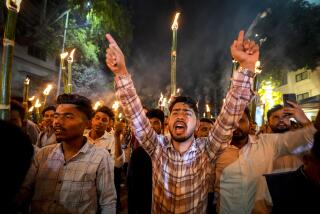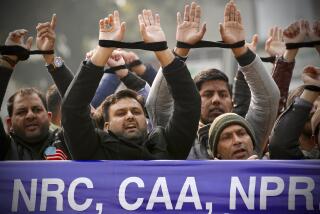India passes massive program to feed 800 million in poverty
- Share via
NEW DELHI — India passed into law Monday an ambitious program to provide nearly free food to some 800 million Indians. Supporters hailed it as a long-overdue fix for the nation’s rampant poverty, while critics slammed it as a shameless and electoral ploy the country can’t afford that will encourage more waste and corruption.
The National Food Security Bill gives two-thirds of India’s population the right to buy 12 pounds of rice, wheat, millet or other cereals each month at no more than 3 cents per pound. It also provides food free to pregnant women, lactating mothers and children under 6 years old.
The government put the price tag of supplying about 62 million tons annually at $18 billion, which would make it one of the world’s largest such programs. A Ministry of Agriculture study estimated the actual cost could be at least 30% higher.
Sonia Gandhi, president of the ruling Congress Party, pushed hard to get the bill passed as her party prepares to run in general elections early next year on a legacy of policy drift, corruption scandals and economic setbacks.
“We have a chance to create history with this bill,” Gandhi told the lower house of parliament late last month. “‘The question is not whether we can do it or not. We have to do it.”
After passing the lower house, the bill received final approval from the upper house on a voice vote Monday following 10 hours of debate.
India has a long history of creating noble-sounding welfare programs, only to see them suffer from mismanagement, graft and neglect. Gandhi’s deceased husband, former Prime Minister Rajiv Gandhi, once famously said he felt lucky when 15% of government funds reached their intended recipient.
Critics applaud the goal of feeding the poor — India accounts for one-third of the world’s impoverished, according to a World Bank study -- but say it will further drain already wobbly government finances during an economic downturn, undercut farmers’ incomes and dent the overall economy.
“What’s right for elections is wrong for the economy,” said Kiran Mazumdar Shaw, managing director of Biocon India Ltd., a Bangalore-based biotechnology firm. “This is nothing but a populist bribe.”
India’s currency hit an all-time low of 68 rupees to the U.S. dollar last week before recovering slightly. The country’s economic growth has declined for several quarters and is currently around 5%. And the fiscal deficit, at 4.8% of gross domestic product, is considered worrisome.
Leaders of the main opposition Bharatiya Janata Party on Monday called the bill an electoral “gimmick” that repackaged many existing subsidy programs into something that sounds new. “For four and a half years you never thought of this?” said opposition lawmaker Venakaiah Naidu. “Suddenly a few months before elections you are rushing through this bill.”
Having passed both houses of parliament, the bill now goes to the president for his signature, considered a formality.
But supporters of the bill said it would not hurt the economy or raise the deficit significantly. “It’s not a cheap bill, but it’s an affordable bill,” said Reetika Khera, a professor of development economics at the Indian Institute of Technology in New Delhi, adding that similar programs have worked in well-managed Indian states. “It’s not quite the disaster it’s made out to be.”
By some accounts, up to 30% of food in India is lost between the farm and the consumer due to bad roads, poor refrigeration, improper storage, corruption and rats.
Backers of the food bill argue that it will plug leaks in India’s public food distribution system through “vigilance committees,” punishment clauses and by other measures that empower citizens to better protect their rights. “There’s a road map on getting from a broken system to fixing it,” Khera added.
Despite two decades of economic expansion, India hasn’t done a very good job of elevating its people out of poverty, especially relative to China. India was ranked in the 2012 Global Hunger Index as one of 15 countries with the most severe hunger, faring worse than Pakistan, Nepal, Sudan and Mali, according to the Washington-based International Food Policy Research Institute.
According to the Indian government’s own estimates, nearly half of all Indian children under five are chronically malnourished.
“You might have a food security bill, but you still have to ensure that people’s needs are met,” Shaw said. “Poor people would benefit a lot more, and you’d spend less, if you just plugged leaks in the existing system. But I don’t think anyone listens to the voice of reason.”
ALSO:
Nelson Mandela home from hospital, remains ‘unstable’
Mohamed Morsi to stand trial in deaths of Egyptian protesters
Outgoing top Vatican official condemns critics as ‘crows and vipers’
Tanvi Sharma in the New Delhi bureau contributed to this report.
More to Read
Sign up for Essential California
The most important California stories and recommendations in your inbox every morning.
You may occasionally receive promotional content from the Los Angeles Times.










